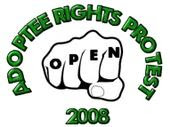 BLUE SPRINGS EXAMINER,
BLUE SPRINGS EXAMINER,January 5, 2008
Fighting an Uphill Battle for Adoptee Rights
If you're an adoptee living in Missouri, four words teeter on the tip of your tongue:
"House Bill No. 509," said Jeff Quibell, a Blue Springs City Councilman and adoptee.
Five years ago, Quibell was reunited with his birth parents.
Fortunately, he was able to locate them quickly through the use of a searcher provided by the court.
The searcher met with each of his birth parents, both of whom agreed to release all identifying information (name, date of birth, place of birth and last known address).
Before Quibell knew it, his arms were curled around his birth mother, and his hand was enclasped within the hand of his birth father.
His journey was unusually easy in a state where original birth certificates and adoption records are off-limits for adoptees.
Most aren't so lucky.
According to Quibell, mutual consent between adoptee and birth parent is a sensible request, but what about adoptees born before birth parents had an opportunity to say "yes" or "no" to future contact in the form of an affidavit at the time of the adoption?
According to the Missouri statute under Adoption and Foster Care, Section 453.121, in order for identifying information to be released to an adoptee either born or adopted in Missouri, the biological parent must submit an affidavit.
If an affidavit is not on file, one is delivered to the parent via a court-driven agency that charges the adoptee a fee (usually $250) for the service.
The statute was revised on Aug. 13, 1986.
Today, birth parents who offer their child up for adoption are asked whether they would like to allow their adopted child access to their identifying information upon reaching 18 years of age.
Prior to that, parents did not have such an opportunity at the time of the adoption.
Of course, parents who have children they've given to adoption can submit an affidavit releasing such information at anytime.
But how many are familiar with this option?
How many really want to remember?
Quibell said for many birth parents - particularly those who had pre-marital children prior to 1973, the year of the landmark Supreme Court abortion case Roe v. Wade - their adopted children are a taboo subject, rarely mentioned but always pondered.
Take Quibell's birth mother, Louise Ann Padmos, for example. In the back of her mind she wondered for years about whatever came of her baby boy. Although Padmos' lips were sealed tighter than a vice, she remembered her adopted son with a new ornament she affixed to the family Christmas tree every year. To her family, it was merely a hobby. To her, it was everything. Now reunited with her adopted son, Padmos gives Quibell a new ornament every year to hang on his own family Christmas tree.
"She never forgot me," Quibell said.
When Padmos was contacted by a searcher wanting to know whether she would fill out the affidavit releasing identifying information to her adopted son, she answered yes to everything that very evening.
Quibell's birth father took the entire summer to make up his mind, then he, too, submitted the affidavit.
But what if the searcher is unable to locate the birth parents? What if the birth parents are deceased and, therefore, unable to submit an affidavit?
"As the statute is written and interpreted right now, there must be an affidavit on file for the identifying information to be released," said state Rep. Connie LaJoyce Johnson, D-St. Louis. "If there isn't one or if it was misplaced for whatever reason, the court will deny the release of the information to the adoptee."
For adoptees in such a situation, the only other possibility of unlocking adoption records and original birth certificates is medical need.
"Supposedly, medical need has to be acknowledged by the court system as a reason to release records to adoptees," Johnson said. "This simply is not true."
The case that drew Johnson into the debate involved an adoptee who was in need of a bone marrow transplant and seeking a possible match within her biological family tree.
A searcher with the court located a few members of the adoptees' birth family and found unfavorable results.
No match.
"The adoptee was simply told 'no match' and denied any identifying information," Johnson said. "I thought that was cold."
Johnson sponsored House Bill No. 509, which, at the moment, sits dormant. The bill would modify sections 193.125 and 193.255 of Missouri's adoption record policy, affording adoptees 18-and-older the right to obtain a certified copy of their original birth certificate, which, of course, would contain some identifying information of the birth parents including their names and birthplaces.
What stands in Johnson's way?
"Catholic charities and evangelists are a well-oiled machine that pulverized this bill the last time it was brought up," Johnson said.
Johnson said Catholic charities and evangelists argue that an open records policy in Missouri would encourage more abortions.
The results of a recent report by the Evan B. Donaldson Institute show a different picture: One of such states as Kansas, which has an open-record policy for adoptees, having lower abortion rates than states with closed records.
But Johnson doesn't care about the findings. She needs testimony. Human voices that can convince the House that the policy isn't constitutional.
"As someone who grew up Catholic, I know where these lobbyists are coming from, and I don't necessarily disagree with them," Johnson said. "Mutual consent and the respect of the birth parents' privacy are dear to my heart, but those adoptees whose birth parents do not have an affidavit on file and are deceased or cannot be located are being unfairly treated; the situation must be rectified, and in order for that to happen we must make this a legal matter, not an emotional one."
One of the voices to give testimony will be Padmos, who plans to visit Jefferson City in the near future.
She will be only one of many birth mothers and adoptees to make the trip as part of an army organized by Blue Springs resident Ina Lewis, an adoptee who has devoted every waking moment to this cause.
Johnson will need them. All of them.
"I won't go before the General Assembly again unless I have guns with real ammunition, ones with stuff that can hit them right upside the head," Johnson said.
Link to article








No comments:
Post a Comment